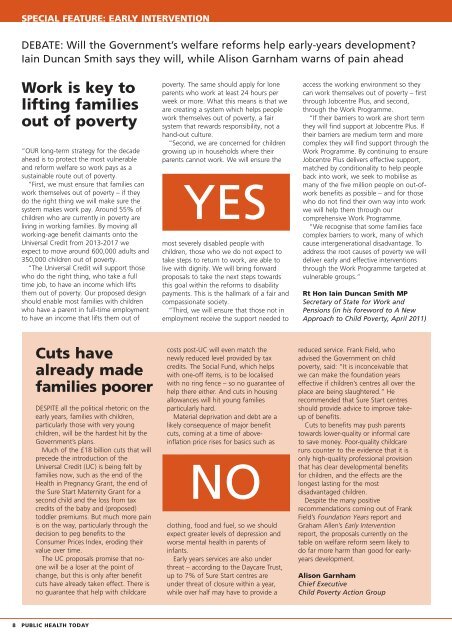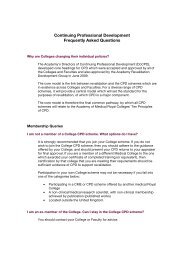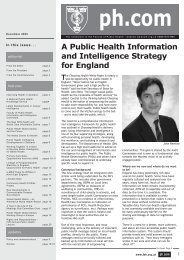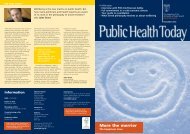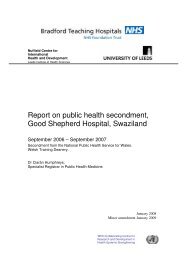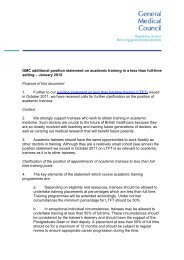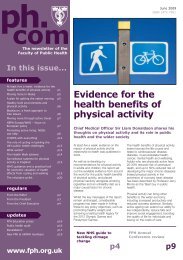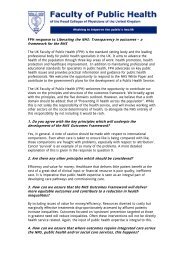PHT June 2011_Jan 10 - UK Faculty of Public Health
PHT June 2011_Jan 10 - UK Faculty of Public Health
PHT June 2011_Jan 10 - UK Faculty of Public Health
Create successful ePaper yourself
Turn your PDF publications into a flip-book with our unique Google optimized e-Paper software.
SPECIAL FEATURE: EARLY INTERVENTION<br />
DEBATE: Will the Government’s welfare reforms help early-years development?<br />
Iain Duncan Smith says they will, while Alison Garnham warns <strong>of</strong> pain ahead<br />
Work is key to<br />
lifting families<br />
out <strong>of</strong> poverty<br />
“OUR long-term strategy for the decade<br />
ahead is to protect the most vulnerable<br />
and reform welfare so work pays as a<br />
sustainable route out <strong>of</strong> poverty.<br />
“First, we must ensure that families can<br />
work themselves out <strong>of</strong> poverty – if they<br />
do the right thing we will make sure the<br />
system makes work pay. Around 55% <strong>of</strong><br />
children who are currently in poverty are<br />
living in working families. By moving all<br />
working-age benefit claimants onto the<br />
Universal Credit from 2013-2017 we<br />
expect to move around 600,000 adults and<br />
350,000 children out <strong>of</strong> poverty.<br />
“The Universal Credit will support those<br />
who do the right thing, who take a full<br />
time job, to have an income which lifts<br />
them out <strong>of</strong> poverty. Our proposed design<br />
should enable most families with children<br />
who have a parent in full-time employment<br />
to have an income that lifts them out <strong>of</strong><br />
poverty. The same should apply for lone<br />
parents who work at least 24 hours per<br />
week or more. What this means is that we<br />
are creating a system which helps people<br />
work themselves out <strong>of</strong> poverty, a fair<br />
system that rewards responsibility, not a<br />
hand-out culture.<br />
“Second, we are concerned for children<br />
growing up in households where their<br />
parents cannot work. We will ensure the<br />
YES<br />
most severely disabled people with<br />
children, those who we do not expect to<br />
take steps to return to work, are able to<br />
live with dignity. We will bring forward<br />
proposals to take the next steps towards<br />
this goal within the reforms to disability<br />
payments. This is the hallmark <strong>of</strong> a fair and<br />
compassionate society.<br />
“Third, we will ensure that those not in<br />
employment receive the support needed to<br />
access the working environment so they<br />
can work themselves out <strong>of</strong> poverty – first<br />
through Jobcentre Plus, and second,<br />
through the Work Programme.<br />
“If their barriers to work are short term<br />
they will find support at Jobcentre Plus. If<br />
their barriers are medium term and more<br />
complex they will find support through the<br />
Work Programme. By continuing to ensure<br />
Jobcentre Plus delivers effective support,<br />
matched by conditionality to help people<br />
back into work, we seek to mobilise as<br />
many <strong>of</strong> the five million people on out-<strong>of</strong>work<br />
benefits as possible – and for those<br />
who do not find their own way into work<br />
we will help them through our<br />
comprehensive Work Programme.<br />
“We recognise that some families face<br />
complex barriers to work, many <strong>of</strong> which<br />
cause intergenerational disadvantage. To<br />
address the root causes <strong>of</strong> poverty we will<br />
deliver early and effective interventions<br />
through the Work Programme targeted at<br />
vulnerable groups.”<br />
Rt Hon Iain Duncan Smith MP<br />
Secretary <strong>of</strong> State for Work and<br />
Pensions (in his foreword to A New<br />
Approach to Child Poverty, April <strong>2011</strong>)<br />
Cuts have<br />
already made<br />
families poorer<br />
DESPITE all the political rhetoric on the<br />
early years, families with children,<br />
particularly those with very young<br />
children, will be the hardest hit by the<br />
Government’s plans.<br />
Much <strong>of</strong> the £18 billion cuts that will<br />
precede the introduction <strong>of</strong> the<br />
Universal Credit (UC) is being felt by<br />
families now, such as the end <strong>of</strong> the<br />
<strong>Health</strong> in Pregnancy Grant, the end <strong>of</strong><br />
the Sure Start Maternity Grant for a<br />
second child and the loss from tax<br />
credits <strong>of</strong> the baby and (proposed)<br />
toddler premiums. But much more pain<br />
is on the way, particularly through the<br />
decision to peg benefits to the<br />
Consumer Prices Index, eroding their<br />
value over time.<br />
The UC proposals promise that noone<br />
will be a loser at the point <strong>of</strong><br />
change, but this is only after benefit<br />
cuts have already taken effect. There is<br />
no guarantee that help with childcare<br />
costs post-UC will even match the<br />
newly reduced level provided by tax<br />
credits. The Social Fund, which helps<br />
with one-<strong>of</strong>f items, is to be localised<br />
with no ring fence – so no guarantee <strong>of</strong><br />
help there either. And cuts in housing<br />
allowances will hit young families<br />
particularly hard.<br />
Material deprivation and debt are a<br />
likely consequence <strong>of</strong> major benefit<br />
cuts, coming at a time <strong>of</strong> aboveinflation<br />
price rises for basics such as<br />
NO<br />
clothing, food and fuel, so we should<br />
expect greater levels <strong>of</strong> depression and<br />
worse mental health in parents <strong>of</strong><br />
infants.<br />
Early years services are also under<br />
threat – according to the Daycare Trust,<br />
up to 7% <strong>of</strong> Sure Start centres are<br />
under threat <strong>of</strong> closure within a year,<br />
while over half may have to provide a<br />
reduced service. Frank Field, who<br />
advised the Government on child<br />
poverty, said: “It is inconceivable that<br />
we can make the foundation years<br />
effective if children’s centres all over the<br />
place are being slaughtered.” He<br />
recommended that Sure Start centres<br />
should provide advice to improve takeup<br />
<strong>of</strong> benefits.<br />
Cuts to benefits may push parents<br />
towards lower-quality or informal care<br />
to save money. Poor-quality childcare<br />
runs counter to the evidence that it is<br />
only high-quality pr<strong>of</strong>essional provision<br />
that has clear developmental benefits<br />
for children, and the effects are the<br />
longest lasting for the most<br />
disadvantaged children.<br />
Despite the many positive<br />
recommendations coming out <strong>of</strong> Frank<br />
Field’s Foundation Years report and<br />
Graham Allen’s Early Intervention<br />
report, the proposals currently on the<br />
table on welfare reform seem likely to<br />
do far more harm than good for earlyyears<br />
development.<br />
Alison Garnham<br />
Chief Executive<br />
Child Poverty Action Group<br />
8 PUBLIC HEALTH TODAY


